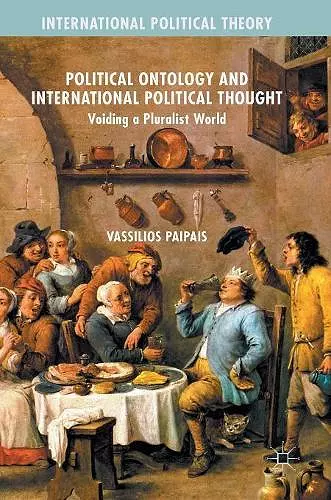Political Ontology and International Political Thought
Voiding a Pluralist World
Format:Hardback
Publisher:Palgrave Macmillan
Published:17th Nov '16
Currently unavailable, and unfortunately no date known when it will be back

"Vassilios Paipais's study is a powerful intervention in the debates in international political theory. Against the depoliticizing tendencies in both liberal and critical political theory, Paipais presents a new political ontology that transposes Heidegger's 'ontological difference' to the terrain of the political and develops a messianic theory of political subjectivity. With this important book Paipais has emerged as a key figure in the ongoing 'ontological turn' in political theory." (Dr. Sergei Prozorov, University of Helsinki, Finland) "In this book Vassilios Paipais offers us a richly textured reflection on the interrelationship between political ontology and the realities of pluralism in both contemporary world politics and in contemporary political theory. Informed by a deep knowledge of the authors with whom he engages, but with eye always on the ways that theoretical debates play out in practice, Paipais has produced a striking intervention that opens up important possibilities for ontological critique in international political thought and beyond." (Professor Nicholas Rengger, St Andrews University, UK) "This brilliant treatise offers a bold contribution to current thinking on the so-called ontological turn. Vassilios Paipais is an important voice of our times. (Professor Mustapha Kamal Pasha, Aberystwyth University, UK)
This book challenges received notions of ontology in political theory and international relations by offering a psychoanalytically informed critique of depoliticisation in prominent liberal, post-liberal, dialogic and agonistic approaches to pluralism in world politics.
This book challenges received notions of ontology in political theory and international relations by offering a psychoanalytically informed critique of depoliticisation in prominent liberal, post-liberal, dialogic and agonistic approaches to pluralism in world politics. Paipais locates the temptation of depoliticisation in their labouring under the fundamental fantasy of various guises of foundationalism (in the form of either political anthropology or ontology as ‘in the last instance’ ground) or, conversely, anti-foundationalism (the denial of all grounds, yet still operating within a foundationalist imaginary). He argues, instead, for a formal political ontology of the void (against historicism) shot through an ‘incarnate’ messianic nihilism (against ethicism and teleological forms of politics). In so doing, the author offers critical readings of the messianic nihilism of Benjamin, Agamben, Taubes and Žižek by problematising the antinomian tendencies in their respective political theologies. The book argues for a version of Žižek’s Badiouian politics of militancy supplemented by a proper participatory understanding of St Paul’s messianic meontology and incarnational Christology as a means to reconceptualise the nexus between subjectivity, universality and political action in world politics. It will be of interest to students and scholars of International Relations theory, political theory, critical social theory and political theology.
ISBN: 9781137570680
Dimensions: unknown
Weight: 567g
241 pages
1st ed. 2017